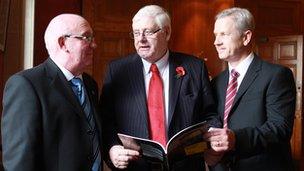Victims tell politicians to make dealing with past a priority
- Published

Alex Bunting, Michael Gallagher and Danny Toland at Stormont on Monday
Troubles victims have called on politicians to prioritise dealing with the past and put in place new measures to deliver truth and justice.
They also want new mechanisms to investigate past human rights violations and abuses.
Alex Bunting, an IRA bomb victim, said: "No one wants to listen - especially within politics."
Bereaved family members from across the community gathered for an event at Stormont on Monday.
The call from victims comes as the five Northern Ireland Executive parties prepare to enter a crucial phase of the Haass round-table talks.
Former US envoy Dr Richard Haass is chairing talks on flags, parading and dealing with the past - areas that have proven difficult for the N0I parties to resolve.
'New commitment'
Michael Gallagher, of the Omagh Self-help and Support Group, whose son Aidan was killed in the Omagh bomb in 1998, said: "Victims feel like they have become an unwelcome embarrassment to some politicians in Belfast, London and Dublin.
"There are thousands of other victims and bereaved family members across Northern Ireland who want to see 'dealing with the past' given a new, high priority by our political leaders.
"Haass presents an opportunity to make that new commitment, but it is crucial that London and Dublin come to the table too."
Danny Toland, whose father John Toland was shot dead by the UDA in Eglinton, County Londonderry, in 1976, said: "The murder of my father was investigated by the Historical Enquiries Team (HET), but we were left with more questions than answers, particularly around the extent of collusion which took place between the UDA and the security forces, which the HET could only say was 'likely'.
"What is now needed is a new, more independent and effective means of investigating all past cases where there are outstanding questions."
Mr Bunting, who was badly injured by an IRA booby-trap car bomb in Belfast in 1991, said: "As victims, we find ourselves having to drive this process forward.
'Painful chapter'
"The political will to grasp the nettle of the past has been missing. That now needs to change.
"The Haass talks are the moment when that dynamic must be reversed - that is my message to politicians."
Patrick Corrigan, Northern Ireland programme director of human rights group Amnesty International, said: "These are the voices to which Richard Haass must listen; the bereaved fathers, mothers, brothers, sisters, husbands, wives and children.
"They are pinning their hopes on these talks now, to deliver the truth and the answers that will allow them to turn the page on this painful chapter for all of Northern Ireland."
Amnesty International recently published an 82-page report, external, Northern Ireland: Time to Deal with the Past, which calls on political leaders to establish a single, overarching mechanism capable of comprehensively addressing the past.
- Published1 November 2013
- Published12 September 2013